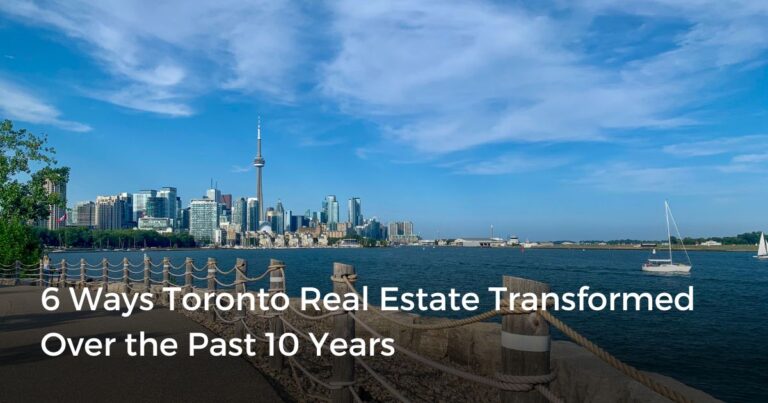Toronto’s real estate market has seen massive shifts over the last decade. From million-dollar milestones to market cool-downs, here are the big things you need to know if you’ve been watching (or wishing you’d bought in) since 2015.

1. Toronto home prices nearly doubled in 10 years
In 2015, the average cost of buying a home in Toronto was $623,531. Fast forward to mid 2025, and that figure is projected to hover around $1.1 million, a staggering 77% surge over just a decade. Even with recent dips and market corrections, Toronto continues to hold its title as one of Canada’s priciest and most competitive housing markets.
In 2015, the median household income for an economic family in Toronto was $82,859. By 2021, it had increased to $106,000, a 28% increase over six years. While that growth might seem significant at first glance, it doesn’t come close to keeping pace with the soaring costs of homeownership, rent, and daily living in the city.
According to the National Bank of Canada, as of spring 2025, a household now needs to earn $275,172 annually to afford an average detached home in Toronto. That’s a 159.6% increase from the $106,000 median income, a massive gap.
Even purchasing a condo isn’t much more attainable. The required household income to afford a typical Toronto condo is $161,079, meaning the average family would need to boost their family’s income by 52% just to make ownership feasible.
2. Detached homes crossed the $1M threshold in 2017
While the market has cooled in recent years, a look back reveals just how rapidly prices escalated, especially in the detached segment. In 2015, the average single detached home cost $691,900. Two years later, Toronto’s detached housing market reached a key milestone. In 2017, the price of an average home surpassed $1M for the first time, hitting $1,086,300, a 31.9% jump from $823,400 in 2016. While prices dipped slightly in 2018, the overall trend remained upward, culminating in a peak of $1.41 million in 2022.

3. Three key years drove the boom
A few standout years fueled significant price hikes:
- 2016: Prices soared 17.38%—sales also hit 118,082
- 2020: Pandemic demand and low interest rates pushed prices up 13.94%
- 2021: Values surged again by 18.54%, with the decade’s highest sales volume
These years defined the “rocket launch” phase of Toronto’s housing market.
4. Toronto’s housing market slowed in 2023 amid rising interest rates
Toronto’s housing market cooled in 2023 as higher interest rates dampened buyer demand. The Bank of Canada raised its policy rate three times that year (in January, June, and July) each time by 0.25%, which pushed borrowing costs higher. That year, fewer than 70,000 homes were sold, and the average price decreased by 5.23%, reaching $1,131,290 in 2023.

5. The condo-to-house price gap skyrocketed
In 2015, the price gap between a Toronto condo and a detached home was approximately $369,200, representing a 72.79% difference. Fast forward to 2025, and that gap is now $910,000—a 146% increase. What was once a logical next step for condo owners looking to move up the property ladder is now a steep financial leap.
6. Toronto condo prices increased over 120% in 10 years
Toronto’s condo market has come a long way in just ten years. The average price of a Toronto condo costs over $100,000 more than the average detached home did in 2015.
Back then, you could buy a downtown condo for under $400,000. Today, that same budget might not even get you a one-bedroom unit. A deacde earlier, 63.3% of all 24,731 sales that year fell within the $200,000 to $399,999 price point, according to TRREB.
Now, the average condo price has soared to $731,232, representing a whopping 126.6% increase. By the end of June, 8,205 condos have traded hands, with a majority of units selling in the $500,000 to $599,999 range.
Buying and Selling in Toronto Today
Toronto ranks as one of the most expensive, and most desirable, cities in Canada, and it’s easy to see why. From incredible food scenes to endless entertainment options, there’s always something to explore. Many neighbourhoods are walkable and transit-friendly, making it easy to live car-free. With millions of people and a mix of vibrant neighbourhoods, finding the perfect place to call home can be an adventure.
Whether you’re buying or renting, the right real estate agent will help you navigate your next move with confidence. Start your search today.
